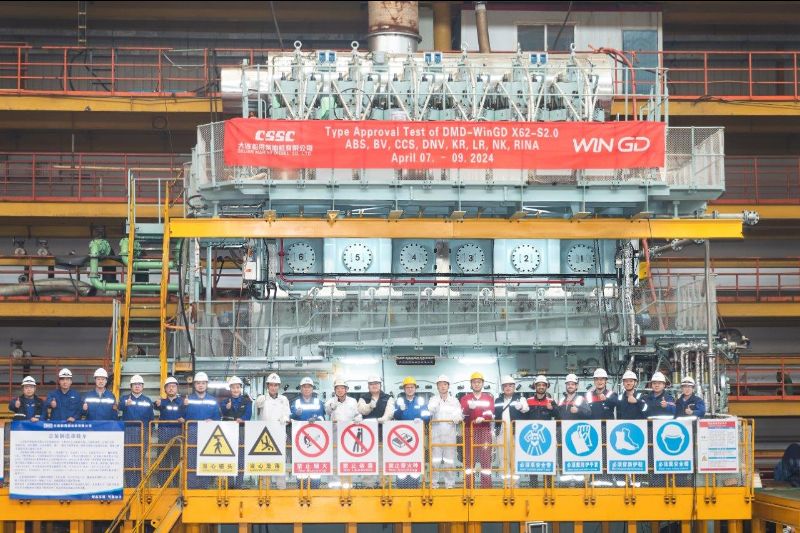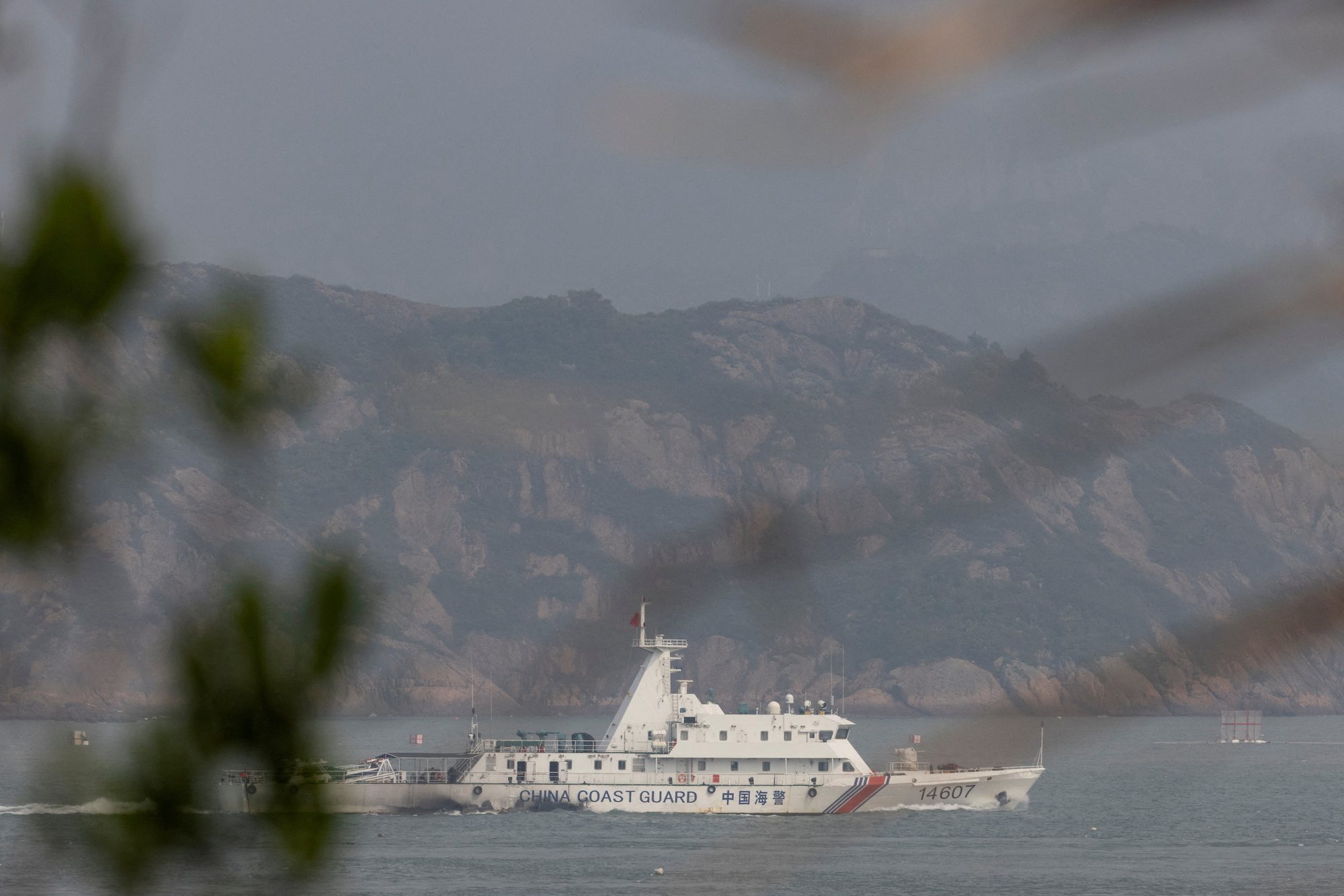Maritime Monday 155
The following is posted by Fred Fry:
Welcome to this 155th edition of Maritime Monday.
You can find Maritime Monday 105 here. (Published 07 April 2008)
You can find last week’s edition here.
You can find links to all the previous editions at the bottom of this post. You are encouraged to participate using the comment link/form at the bottom of the post. If you have photos or stories to tell, do email me at [email protected].
—————————————-
This Week’s Photos:
This week’s photos come from the website of Washington State’s Port of Grays Harbor:
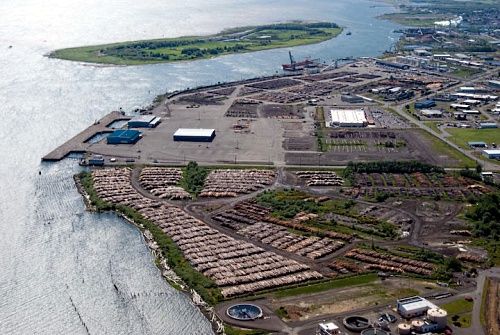
* Terminal Area *
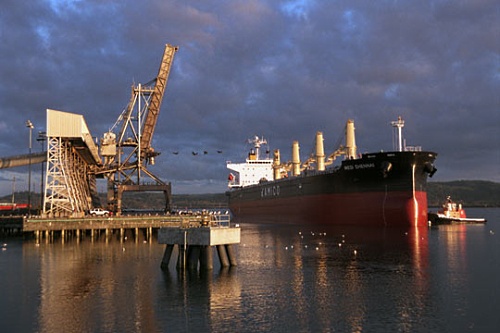
* MEDI CHENNAI *
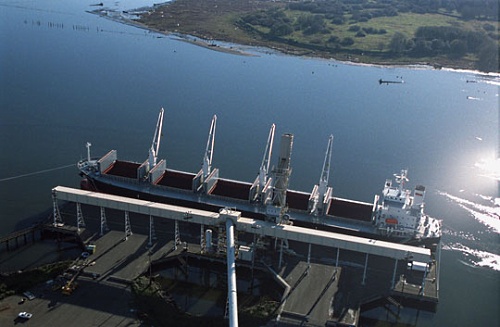
* ANGELA *
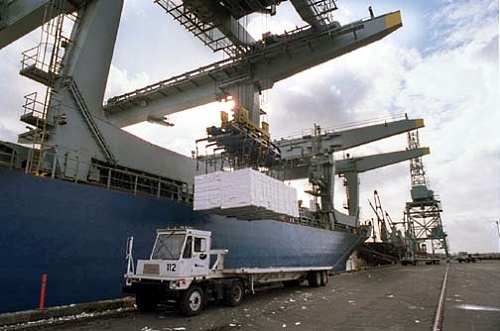
* STAR AMERICA *
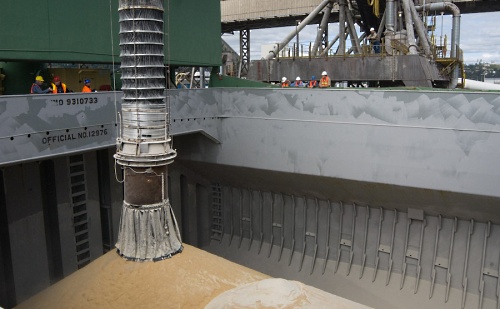
* Grain Loading Spout *
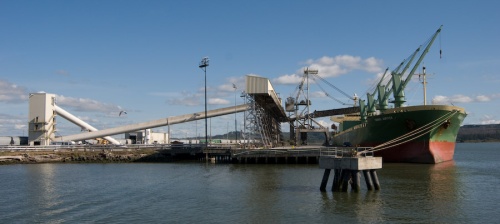
* SANKO JUPITER *
Their homepage can be found here.
—————————————-
This Week’s Items:
EagleSpeak has “Somali Pirates: Lawfare and the Lack of “Cultural Ruthlessness”“. That would be our lack of Cultural Ruthlessness just in case you had any doubt.
Also be sure to check out EagleSpeak‘s weekly series “Sunday Ship History: Ship Propulsion – Steam Turbines“
gCaptain has “The Merchant Navy – A New Reality TV Show” and “Return To Sender – Hawaii Superferry Returns To Alabama Shipyard“.
The Institute for Energy Research has “20 Years Later: Lessons from Exxon Valdez Teach Us That Better Technology, More Production Reduces Chances of Spills“.
Since the Exxon Valdez tanker spill, oil imports have increased 67 percent to the U.S., as U.S. oil production has plummeted. For example, Alaskan oil production has dropped over 61 percent since the spill. More North American oil means more jobs for Americans, less foreign oil from unstable regions, and fewer (and less) oil spills.
BitterEnd has “captain of the ill-fated Queen of the North ferry is getting his job back” and the reaction with “Queen of the North Comment“.
59° 56′ N compares working conditions on US and North Sea offshore supply boats with “Culture difference, but why?“.
The American arrangements are, I am quite certain, more the rule than the exception worldwide. But I wonder why the business is so primitive in the states, all things considered. Is it part of that glorious American laissez-faire tradition, which is particularly strong in the southeast and in the oil biz? Are Americans more risk-friendly? Has low-status oilfield work just created a downward spiral?
Not mentioned was a comparison of salaries. Another complaint was that the US supply boats were not as luxurious as those in the North Sea. Come to think of it, there was no comparison of the weather conditions either.
BreakBulk Industry News has “Grimaldi adds Boston call to West Africa ro-ro service“.
SAILORS, MARINERS & WARRIORS LEAGUE has “Canada Puts Sea Shepherd Protest Ship Up For Auction“.
In a news release earlier this month, Paul Watson of the Sea Shepherd Conservation Society issued a stern warning to any potential buyer of the ship, which he claims was illegally seized. “I have no intention of recognizing the validity of any sale ordered by the Canadian government,” Watson said in the release. “Whoever buys the ship should be aware that we retain the registry and the original bill of sale and we will take back what is ours at the first opportunity. “You don’t steal a ship from a pirate without repercussions.”
They should give it to their Navy to use for target practice.
Hellenic Shipping News has “A deluge of new ships pours into a drowning industry“.
Orders for new ships have, not surprisingly, collapsed and scrutiny has shifted from what can be bought to what can be cancelled: nothing, it turns out, without great effort. South Korea’s shipyards, the global leaders, have learnt from previous busts. They typically demand 20% up front, a further 60% during construction, and the final 20% payment upon delivery. Walk away and you lose a fortune. These shipyards have good reason to play tough. Along with a loss of revenue, cancellations cause operational chaos.
HAWSEPIPER: The Longest Climb stands his first watch alone with his new company while summarizing the legal mess that had been going on at home.
Bob Couttie’s Maritime Accident Casebook has “The Case Of The Unwatched ZOCs“.
ECDIS may not be any more accurate than paper charts, especially when using raster charts based on paper charts. Don’t assume that because it runs on a computer it’s more accurate. Over the next few years areas are being resurveyed to create electronic charts following International Hydrographic Organisation standards but they will only cover 800 of the busiest ports.
US Naval Institute Blog has “The new SECNAV (designate)“.
Puget Sound Maritime has “Gregoire signs Neah Bay rescue tug bill into law“.
MarineBuzz has photos with “HMAS Yarra and HMAS Norman Locate Lost Containers of MV Pacific Adventurer” and coverage: “Yacht Trishna in Bison Blue Waters Expedition by Indian Army in Lakshadweep Islands“.
intheboatshed.net has “27ft type K Montagu whaler“.
Politiken has “Drunken sailors – mostly E. Europeans“. Go read the story for examples of accidents as late as last Sunday.
According to Newspaq, the Danish Pilots Association says that maritime authorities should raise the issue of the Eastern European maritime drinking culture with the relevant countries concerned.
“It is shameful for the profession that such large ships can sail around with dead drunk people on board,” says Gantzholm.
—————————————-
Lloyd’s List has “Hong Kong blames Korea tugs for Hebei Spirit spill“.
The towing wire was also found to be a used crane runner wire that had been stored for some time. “Crane wires tend to be of a different construction when compared with a towing wire due to their different mode of operation. The use of improper tow wires could be dangerous because of possible shock loading and chafing of the wire while engaging in towing,” the note added.
Lloyd’s List Newsroom Blog has “Toxic ship loans“.
Some brokers are still not publishing secondhand prices because the market is so thin, but those that are have marked prices down steeply. A 10-year old, 1,700 teu ship that could have been sold for around $28m in early 2008 may be worth just $11m today, a plunge of 60%. This puts owners in a real predicament as they are left holding rapidly depreciating assets.
Of course, they only become toxic if companies stop making payments.
Maritime Compass has “Gold Rush Port“.
Tugster has lighthouse photos with “Bright Lights 3“.
Sea * Fever has “Bad News Day For Maritime Heritage And Professional Mariners“.
In Peace and War has “RIP – Frankie Toner, USMMA Class of 2006“. HE was serving on active duty with the US Navy in Afghanistan.
Naval Open Source INTelligence has “Report: Chinese navy has new sub base in Pacific“.
iCommandant – Web Journal of Admiral Thad Allen has ““Coast” Guard Conducting Mid-Western Flood Ops“.
MarineLog has “GAC launches ship lay-up service“. (GAC = Gulf Agency Company)
The Journal of Commerce has “U.S. Ports Plan Clean-Truck Programs – Ports across the country are developing programs to cut pollution“.
jacksonville.com has “Biggest cargo ship ever to visit Jacksonville arrives at JaxPort“.
Measuring 983 feet long — more than three football fields — and 122 feet wide, the MSC Catania was able to enter the port because it was only loaded at 13 percent of capacity.
Trade and Logistics Malaysia has “Daily charter rates fall for offshore support vehicles“.
—————————————-
Maritime Reporter has “New On-Line Sharing Site for Ship Design“.
Information Dissemination has “UNCLOS: The Coast Guard Weighs In“.
The Old Salt Blog has “Jenny – RIP“.
Jenny, who has died aged 92, was a legend to generations of sailors who visited Hong Kong; despite the colony’s constant change, she remained the same incomparable institution for most of her life.
Jenny led a side party of girls who attached themselves to ships when they arrived in Hong Kong, taking over the domestic economy and husbandry of each vessel. They washed and ironed, cleaned ship, chipped rust and painted, attended as buoy jumpers, and, dressed in their best, waited with grace and charm upon guests at cocktail parties.
CBC News (Canada) has “St-Pierre residents lobby for return of freighter link with Newfoundland“.
Residents of the tiny French-owned islands of St-Pierre-Miquelon are pushing for the return of direct freight service with southern Newfoundland.
Few goods, including building materials and even fresh produce, have made it St-Pierre-Miquelon since the Cap Blanc cargo ship sank in December, killing four crew. The Cap Blanc had been transporting a load of road salt when it capsized in foul weather.
CBC News also has a related story with “France, Canada poised for battle over Atlantic seabed rights“.
The French government said Wednesday it will file a letter of intent with the UN laying claim to a larger swath of the seabed for its St-Pierre-Miquelon territory, just south of Newfoundland.
The roughly 6,000 inhabitants of the North Atlantic archipelago want to develop their economy by expanding their access to the seabed, which is potentially rich in gas, marine and oil resources.
This story has over 400 comments already. This threat alone looks like a good enough reason for the Canadians to do nothing to make resupply of the islands any easier. The French-controlled Islands in Canada were first covered in Maritime Monday 81.
An Unofficial Coast Guard Blog has “Can the Coast Guard (or U.S.) match Russia in the Arctic Domain?“.
Shipgaz has “Baltic Pilot takes on redundant Finnish pilots“.
MarineLog has “V. Ships slams Hebei Two accusations by Korean Register chief“. Korea’s behavior at every level in response to this incident is a global low for the industry. It is beyond shameful.
Press of Atlantic City has “Danger a fact of life for crews aboard scallop boats“.
Telegraph (UK) has “Curse of the Aurora as passengers revolt“.
MosNews has “Protests held as US Navy ship arrives at Crimean base“. The ship is the USS KLAKRING and the port is the Ukraine’s Sevastopol.
Western Morning News has “Napoli debris is snagging fishermen’s nets“.
KGW Portland has “KGW exclusive: Only woman to navigate risky Columbia River Bar” as they take a trip with Captain Deborah Dempsey, ‘the only female Columbia River Bar pilot’.
The Cousteau Society has “Calypso Saved!” as the ship enters shipyard for long needed repairs. Wikipedia has background on the over decade’s long dispute over the vessel.
Ice News has “Can Denmark claim the North Pole?“
Inside GNSS has “European Court of Auditors Lambastes Galileo Satellite Navigation Program“. If the EU ever does manage to build their own GPS System, who is going to use it? Whose throats are they going to shove it down?
Cruise Bruise has “CDC Inspection Score Manipulation – Cruise Ship Crew Hiding Filthy Kitchenware” including photos and video of massive amounts of kitchen equipment stowed in crew passageways.
“80% of all galley equipment is being stored in Accommodation area, far away from seemingly not very interested eyes of USPH inspectors. With inspections being fairly predictable, roughly every 6 months, as the time comes close, galley personnel drags majority of everyday utensils to their cabins and in nearby corridors. What stays in galley pot-wash areas are huge items that occupy space on shelves and give impressions of fullness.”
TransWorld Surf has “10 Hottest Girls In Pro Surfing“. (Found via the Horse’s Mouth)
Mr. Boat Blog has “The 13 Coolest Things Made from Recycled Bottles.” Which includes one island and two boats.
The Great Beyond has ocean seeding experiment failure with “Results cast doubt on potential ‘climate fix’“.
The Maritime Executive has “The Many Faces of CMA 2009“.
I think a lot of folks arriving at the show were wondering what sort of collective mood that they might encounter. Speaking for myself only, I can report an upbeat crowd that was eager to do business and optimistic that the uptick in the economy might just be around the corner. You heard it here first.
BarentsObserver has “15 million tons of Russian oil through Barents Sea“.
Helsingin Sanomat has “Poor oxygen situation threatens Gulf of Finland – once again“.
59° 56′ N has good fun with “BBC Box abandoned, broken up on Bengali beach“.
MetaCafe has a video tour: “Supertanker Engine Room Tour“.
[metacafe]http://www.metacafe.com/watch/yt-0hbG9C6bhZE/supertanker_engine_room_tour/[/metacafe]
—————————————-
Fairplay Daily News has:
Russian shippers looking abroad – LACK OF port capacity and corruption in Russia is forcing the country’s shippers to do business elsewhere, British consul general for Russia William Elliott told Fairplay today at a London Ports and Terminals Groups meeting.
Some Russian businessmen are opting to pay higher prices to use foreign ports such as Tallinn in Estonia, which offers greater efficiency and is usually ice-free.
But Elliot added that it should not be assumed that foreign ports are taking business away from Russia, as insufficient capacity – particularly for containerised cargo – is a major problem for the country. Only 16% of Russia’s throughput is containerised, putting it “out of kilter with the rest of the world”.
According to Elliott, the Russian government has earmarked £14Bn to raise standards at the country’s ports over the next five years. But whether ports will actually receive these funds in light of Russia’s growing economic problems is uncertain. “The government is nervous that it may need that money,” said Elliot. – Fairplay Homepage (Used with Permission)
AND:
Prepare for upturn, Kolding says – PREPARE for market recovery is Maersk CEO Eivind Kolding’s positive message.
“I’ve never heard of a crisis that does not end,” CEO Eivind Kolding told Fairplay in Copenhagen yesterday, adding: “For sure it will come to an end. Consumers just need to gain confidence, then we will have an upturn.”
The Maersk Line boss went on to underline the importance of focusing on customers to ensure companies stay profitable in the current economic climate: “People forget that in a downturn, but now the customer is needed even more.”
Priorities for Maersk include maintaining its market share and being more efficient in watching costs.
“We need to keep all costs down, that’s our focus,” said Kolding.
He even stuck to a positive approach about the loss predicted for Maersk Line this year.
“It’s too early to tell,” he said, adding: “I don’t think anyone has a clear view of this.” – Fairplay Homepage (Used with Permission)
—————————————-
Submissions for future editions:
Please submit articles for inclusion in next week’s edition using the following submit form at Blog Carnival. You are also welcome to email stories and photos to [email protected] for inclusion in future editions as well as suggest areas of coverage.
—————————————-
Previous Editions: As linked below or click on the tag ‘Maritime Monday’ for all gCaptain editions.
1 – 2 – 3 – 4 – 5 – 6 – 7 – 8 – 9 – 10 – 11 – 12 – 13 – 14 – 15 – 16 – 17 – 18 – 19 – 20 – 21 – 22 – 23 – 24 – 25 – 26 – 27 – 28 – 29 – 30 – 31 – 32 – 33 – 34 – 35 – 36 – 37 – 38 – 39 – 40 – 41 – 42 – 43 – 44 – 45 – 46 – 47 – 48 – 49 – 50 – 51 – 52 – 53 – 54 – 55 – 56 – 57 – 58 – 59 – 60 – 61 – 62 – 63 – 64 – 65 – 66 – 67 – 68 – 69 – 70 – 71 – 72 – 73 – 74 – 75 – 76 – 77 – 78 – 79 – 80 – 81 – 82 – 83 – 84 – 85 – 86 – 87 – 88 – 89 – 90 – 91 – 92 – 93 – 94 – 95 – 96 – 97 – 98 – gCaptain Editions: 99 – 100 – 101 – 102 – 103 – 104 – 105 – 106 – 107 – 108 – 109 – 110 – 111 – 112 – 113 – 114 – 115 – 116 – 117 – 118 – 119 – 120 – 121 – 122 – 123 – 123a – 124 – 125 – 126 –127 – 128 – 129 – 130 – 131 – 132 – 133 – 134 – 135 – 136 – 137 – 138 – 139 – 140 – 141 – 142 – 143 – 144 – 145 – 146 – 147 – 148 – 149 – 150 – 151 – 152 – 153 – 154 – 155
—————————————-

Subscribe for Daily Maritime Insights
Sign up for gCaptain’s newsletter and never miss an update
— trusted by our 109,121 members

Get The Industry’s Go-To News
Subscribe to gCaptain Daily and stay informed with the latest global maritime and offshore news

 Join The Club
Join The Club



